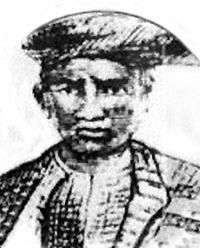Lela Pandak Lam

Dato Maharaja Lela (died on 20 January 1877) was a Malay nationalist from Perak.
A descendant of Daeng Salili, Pandak Limo was the son of a Bugis king from Luwuk District, Sulawesi. During the reign of Sultan Muzaffar Shah III, he came to Perak and was appointed Mufti and was awarded the title "Dato Maharaja Lela," granting him the authority to punish by decapitation without question.
Pandak Limo was a leader who later led the struggle against the British in Perak. Together with other leaders such as Dato 'Sagor , he planned an alliance to assassinate James Wheeler Woodford Birch (J. W. W. Birch), the British Resident of Perak. His decision was approved in a meeting at Durian Sebatang, chaired by Sultan Abdullah on 21 July 1875.
Dato Maharaja Lela and his assistants, Sepuntum and Pandak Lam speared Resident Birch to death on 2 November 1875, as Birch was taking his bath by a river near Pasir Salak, which is located somewhere around today's Teluk Intan (Teluk Anson).
There is debate over the reason for Birch's assassination. One view is that he was assassinated was because he outlawed slavery in Perak. Dato Maharajalela, whose income depended on capturing and selling the natives of Perak or Orang Asli as slaves, was then incensed and plotted with some of the slave-traders to kill Birch by spearing him when he was taking his bath in the river.[1][2][3]
The more popular view among right-wing Malay historians is that Birch was assassinated because of his disrespect for the local customs and traditions, which raised tensions with local Malay chiefs. This is because modern Malay historians generally refuse to accept that the Orang Asli were being traded as slaves in the pre-Colonial era. Some accounts claim that Birch even entered the palace of the ruler Sultan of Perak without removing his shoes.
The murder of J. W. W. Birch led the British army to attack Pasir Salak, and following several days of battle, the leaders of the rebellion surrendered. In a subsequent trial held between 14 and 22 December in Matang, Perak, Sultan Abdullah and Ngah Ibrahim was deposed and sent to exile in Seychelles. Dato Maharajalela, meanwhile, was found guilty for the murder of Birch and sentenced to death. He was executed by hanging on 20 January 1877 in Taiping. In the wake of the incident, the British administration was shifted to Taiping.
Dato' Maharajalela is generally celebrated as a folk hero by Malay nationalists, and seen as a symbol of the Malay resistance against British colonialism.
The terms maharajalela (in Malay language), and merajalela (in Indonesian language), stem from his name to describe uncontrollable actions or phenomenona.
See also
- Rentap
- Syarif Masahor
- Rosli Dhobi, a famous Malay Sarawakian who killed Sir Duncan Stewart
References
- ↑ "Perak War". Britannica Online. Retrieved 25 July 2013.
- ↑ Leasor, James (2001). Singapore: The Battle That Changed the World. House of Stratus. pp. 45, 46. ISBN 978-0755100392.
- ↑ Hussin, Iza. "The Pursuit of the Perak Regalia: Islam, Law, and the Politics of Authority in the Colonial State" (PDF). University of Chicago. pp. 772, 773. Retrieved 25 July 2013.
- Sources
- Laman web Perpustakaan Negara Malaysia
- Pejabat DYMM Sultan Perak Darul Ridzuan
- Adopted from Sejarah Tingkatan 2 & Sejarah Tingkatan 5 text book.